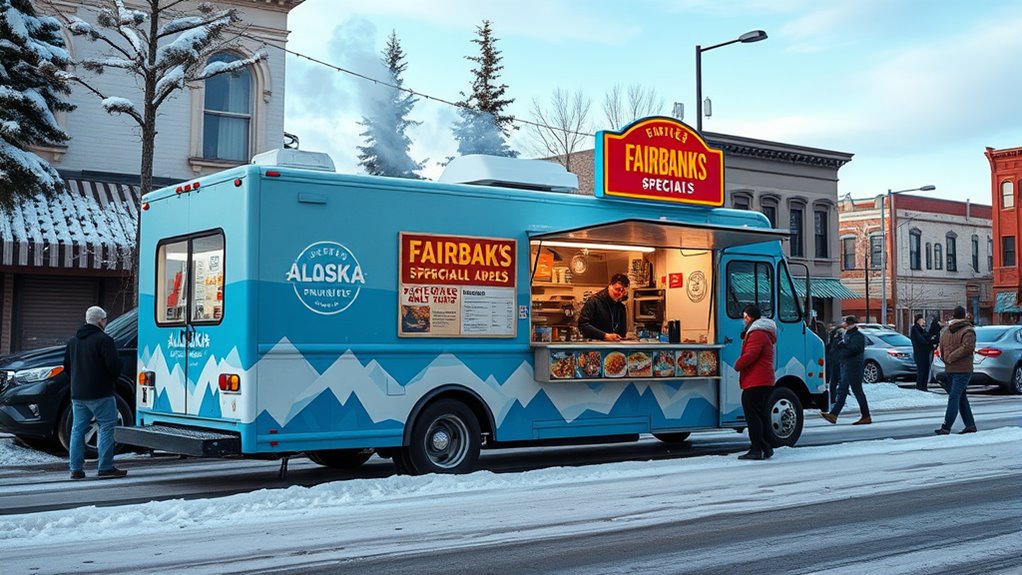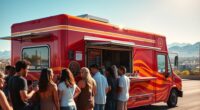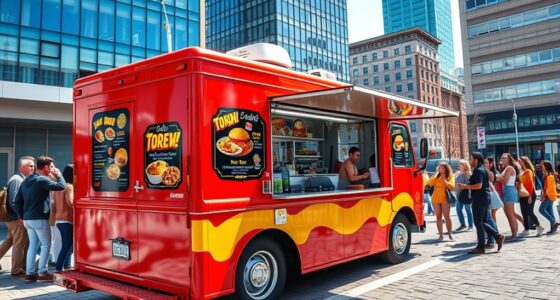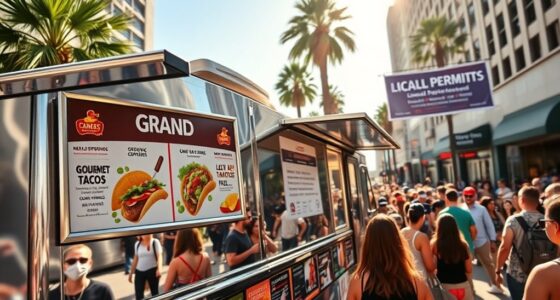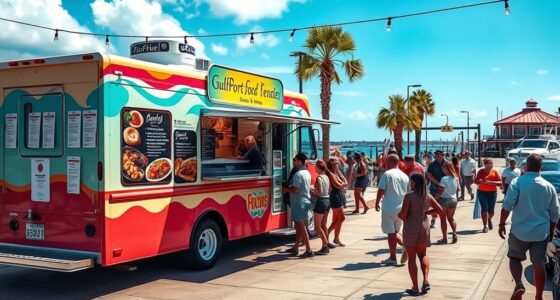To open a food truck in Fairbanks, you’ll need permits like the Food Establishment Permit, fire safety approval, and an Alaska Business License, costing around $1,000–$2,000 initially. Choose strategic locations such as festival sites or downtown areas, and develop a compliant menu focused on non-hazardous foods. Effective marketing, especially via social media and community events, boosts visibility. Prepare for winter by weatherproofing your truck. Exploring these steps thoroughly will help set your truck up for success.
Key Takeaways
- Obtain necessary permits from Alaska DEC, fire, zoning, and city agencies, with initial costs around $1,000-$2,000 and annual renewals.
- Invest in equipment ($1,000-$10,000 per item), supplies ($2,000-$5,000), and safety upgrades to ensure compliance and efficiency.
- Choose high-traffic year-round locations like the End of the Line Food Truck Park and participate in community events for visibility.
- Develop a menu featuring non-hazardous foods, ensuring proper storage, temperature control, and adherence to Alaska food safety regulations.
- Use social media, GPS apps, and local events for marketing, while preparing for climate challenges with insulation, weatherproofing, and seasonal maintenance.
Navigating Permits and Licensing Requirements in Fairbanks
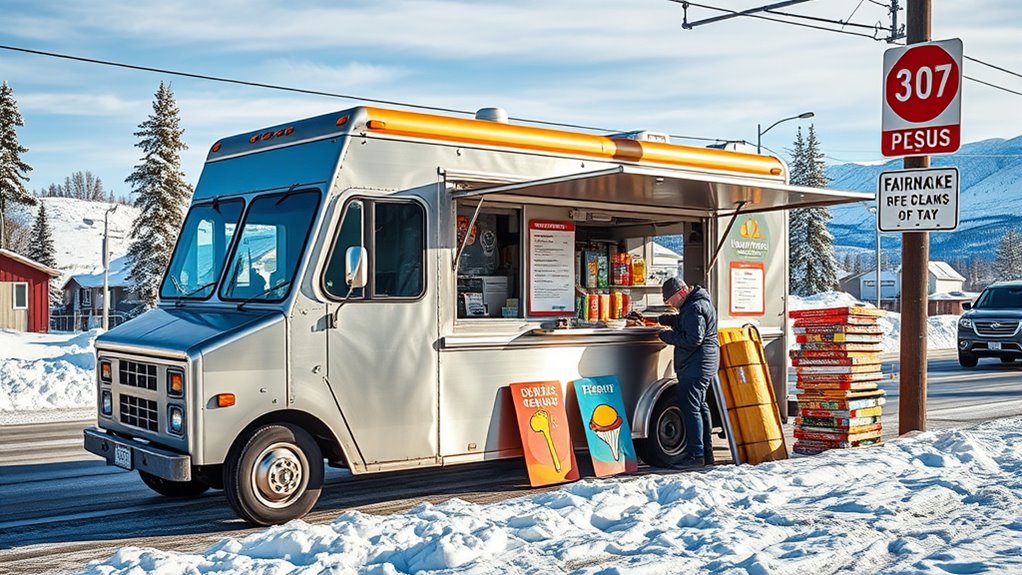
Managing permits and licensing in Fairbanks is essential for legally operating a food truck. You’ll need a Food Establishment Permit from the Alaska Department of Environmental Conservation (DEC), which requires a detailed menu, applicable fees, and possibly a HACCP plan for specific food processes. You’ll also submit a plot plan, floor plan, plumbing schematic, and equipment list. Additional approvals from city and state agencies, like fire, plumbing, waste, and zoning, may be necessary. An Alaska Business License is mandatory, along with a Certificate of Insurance that meets regulations. Passing a Fire Marshal inspection is required for fire safety compliance. If operating on borough parks, you’ll need a Mobile Concession Permit, with options for daily or seasonal permits. Make sure all documentation is complete to avoid delays. Ensuring compliance with newborn safety guidelines can help prevent potential health issues related to food storage and handling.
Estimating Expenses for Launching and Running a Food Truck

To get your food truck up and running in Fairbanks, you’ll need to budget for permit and licensing costs, which can range from a few hundred to over a thousand dollars annually. Equipment and supplies expenses vary based on your menu and truck size, with initial costs potentially reaching $60,000 or more. Don’t forget ongoing operational and maintenance fees, including fuel, repairs, and insurance, which are essential to keep your business moving smoothly. Additionally, considering the seasonal climate in Alaska, investing in proper insulation and heating equipment can help ensure your truck operates efficiently year-round. Proper storage of supplies and ingredients is also crucial to prevent spoilage, especially given the signs of spoilage that can occur with perishable items.
Permit and Licensing Costs
Launching a food truck in Fairbanks, Alaska, involves several permit and licensing costs that you’ll need to budget for. State food service permits range from $400 to $645 annually, depending on the type, with plan review fees also between $400 and $645. A wastewater review fee of $30 might apply, but some conditions can waive this cost. You’ll need a vehicle permit from the city costing $200 for two years plus a $100 transfer fee if applicable. If you plan to participate in multi-vendor events, permits cost $250 or $500, depending on size. Additionally, a business license costs $35 per event or day, and insurance, safety inspections, and possible special event fees add to your expenses. Overall, initial permit costs typically range from $1,000 to $2,000. Including the necessary permits and licenses is essential for legal compliance and successful operation.
Equipment and Supplies Expenses
Equipping your food truck requires a careful estimate of various expenses, from essential appliances to safety systems. Commercial-grade appliances like grills, fryers, ovens, and refrigerators can cost between $1,000 and $10,000 each, depending on size and quality. You’ll also need mixers, prep tables, ventilation, and fire suppression systems, which can add several thousand dollars to your setup. Custom cabinetry and storage solutions might range from $3,000 to $7,000. Initial inventory costs typically fall between $2,000 and $5,000, with additional expenses for paper goods and ingredients. Smallwares such as knives, cutting boards, and utensils can total $500 to $1,500. Remember, these costs are essential investments in creating a functional, compliant, and efficient food truck for Fairbanks. Incorporating vintage decor and rustic materials can also enhance the truck’s appeal and attract customers.
Operating and Maintenance Fees
Estimating operating and maintenance fees is essential for ensuring your food truck in Fairbanks remains profitable and compliant. You’ll face routine costs like vehicle maintenance, repairs, and fuel, which vary seasonally and can be higher in remote areas. Waste disposal services for cooking oil, greywater, and trash add ongoing expenses, along with sanitation supplies meeting local health standards. Licensing costs include permit and plan review fees, typically between $400 and $645 annually, plus possible extra charges for special events or university property. Insurance coverage, including liability, varies widely, and compliance inspections from health and fire authorities can incur fees. Additionally, you should budget for potential upgrades due to evolving food safety laws, ensuring your operation remains compliant and efficient. Considering the specific needs of a Flat Iron Bike and related equipment can also influence your maintenance budget, especially if electric components are involved.
Best Spots for Operating a Mobile Food Business in Fairbanks
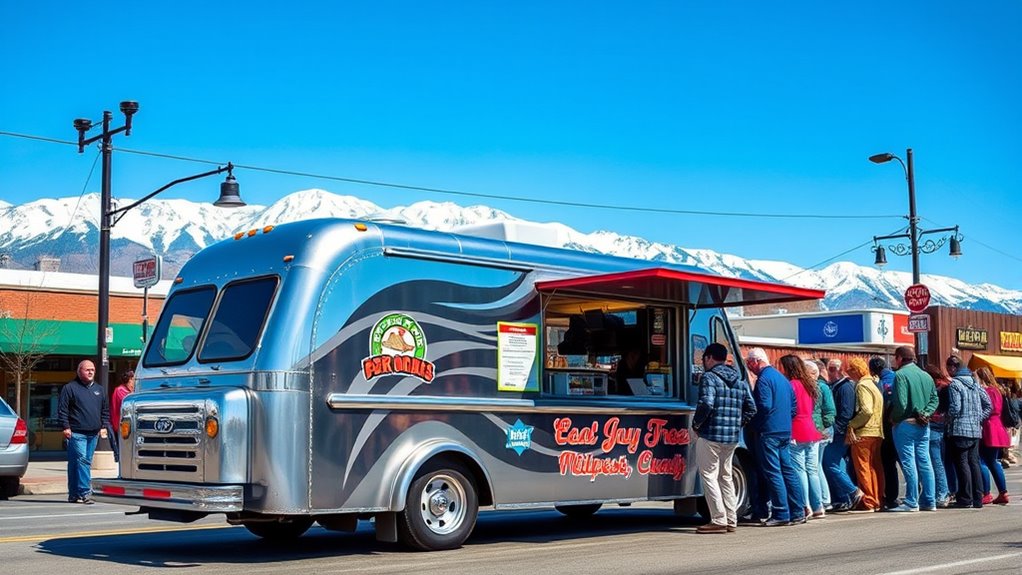
Fairbanks offers several prime spots for mobile food businesses to thrive, with the End of the Line Food Truck Park standing out as a year-round hub. Located downtown at 1243 Noble St., it provides 12 dedicated parking spots, with six offering utility hookups for easy access. The park features indoor and outdoor seating, restrooms, and event space, making it convenient for both operators and customers. Operating daily from 8 a.m. to 8 p.m., the park’s community-focused atmosphere encourages customer interaction and boosts visibility through events like grand openings and live radio promotions. Nearby downtown areas, especially during local festivals and public events, generate high foot traffic. Seasonal spots near attractions and campuses also present excellent opportunities, especially during peak tourist months. Additionally, portable catering equipment such as mobile grills, warming stations, and portable refrigeration units can enhance service efficiency and menu variety for mobile vendors.
Crafting a Menu That Complies With Food Safety Standards

Creating a food truck menu that complies with food safety standards is essential for protecting customer health and ensuring legal operation. You need to prioritize non-potentially hazardous foods like baked goods, jams, and jellies whenever possible. All ingredients must meet Alaska’s food safety rules, avoiding disallowed items such as shellfish, wild game, or homemade foods not approved for sale. When including cooked or ready-to-eat items, ensure proper temperature controls and sanitation measures are in place. Packaging and labeling should account for shelf-stable, refrigerated, or frozen products to prevent spoilage or contamination. Additionally, document your menu items, ingredients, and preparation methods to verify compliance. Maintaining accurate records helps demonstrate adherence to safety standards and supports smooth inspections. Proper handling and storage of ingredients, as outlined in food safety standards, are crucial to prevent foodborne illnesses.
Effective Strategies for Marketing and Promoting Your Food Truck

Effective marketing and promotion are essential for attracting customers and increasing sales for your food truck. Social media is a powerful tool—75% of food trucks actively market on Facebook, leading to a 20% sales boost for over half of them. Engaging regularly with followers encourages customers to spend about 15% more. Participating in local events and festivals increases your visibility and foot traffic. Over 80% of trucks join at least three events annually, creating valuable cross-promotion opportunities. Leveraging GPS and mobile apps makes it easier for customers to find you, boosting traffic by 45%. Building a loyal customer base through email marketing and loyalty programs can increase repeat visits by 30%. Focus on branding and targeting key demographics like millennials to stand out in Fairbanks’s competitive market. Incorporating market volatility insights can help you adapt your marketing strategies to changing customer preferences and economic conditions.
Overcoming Operational Challenges in the Alaskan Climate

Operating a food truck in Alaska presents unique challenges that go beyond marketing efforts. Harsh temperatures demand robust insulation and weatherproofing to keep equipment and ingredients safe. You’ll need specialized maintenance to prevent freezing issues, and snow and ice require regular clearing to ensure safety and access. Cold weather affects fuel efficiency and battery performance, so cold-grade fuels and battery warmers are essential. Storms and wind chills can limit outdoor service, so plan for sheltered areas or closures. Supply chain disruptions mean stocking up on hardy, locally sourced ingredients and maintaining backup power to keep cold storage running. Outfitting your truck with heaters, insulated compartments, and durable, slip-resistant surfaces will help you operate smoothly despite Alaska’s extreme climate and unpredictable weather, ensuring your business remains resilient in the face of seasonal challenges. Additionally, implementing proper insulation techniques can significantly reduce energy costs and improve overall efficiency during the colder months.
Frequently Asked Questions
What Are the Specific Zoning Restrictions for Food Trucks in Fairbanks?
You need to know that Fairbanks’s zoning laws don’t explicitly list food trucks, but they usually operate in commercial zones like GC or LC districts. You can run your truck on private property with owner permission, but street or public space operations often require extra permits. Always check with the borough zoning office to confirm if your desired location complies and avoid legal issues.
How Do Weather Conditions Affect Food Truck Operation Seasons in Fairbanks?
Weather conditions in Fairbanks notably impact your food truck’s operational season. You’ll find the best months are late spring through early fall when temperatures are milder and outdoor dining is comfortable. Harsh winters with extreme cold, snow, and limited daylight restrict your business’s outdoor activities. To maximize your season, plan for flexible hours, weather-appropriate equipment, and seasonal menu changes, focusing on summer festivals and community events for ideal customer turnout.
Are There Any Grants or Financial Assistance Programs Available for New Food Trucks?
Think of grants as a lighthouse guiding your food truck journey through foggy financial waters. You can access local programs like the Fairbanks North Star Borough’s Match Assistance Grant, offering up to $25,000 with matching funds. Federal options like USDA’s Community Food Projects support food security initiatives with grants from $25,000 to $400,000. These resources can help fund infrastructure, community outreach, and startup costs, making your food truck dream more attainable.
What Insurance Coverage Is Recommended Beyond Basic Liability for Food Trucks?
You should consider insurance beyond basic liability to protect your food truck thoroughly. Commercial auto insurance covers collision, extensive damage, and driving liabilities. Business interruption and spoilage coverage safeguard your income and inventory during downtime. Equipment and property insurance protect portable tools and appliances. Also, look into specialized coverages like product liability, professional liability, and umbrella policies to handle potential claims, ensuring you’re fully protected as you grow your food truck business.
How Can I Find Reliable Commissary Facilities in Fairbanks?
Did you know Fairbanks has over 20 licensed commissary kitchens catering to food entrepreneurs? To find reliable facilities, search online for curated lists specific to Fairbanks, check local directories, and contact the Alaska DEC Food Safety Program for verified options. Visit facilities like JP Jones Center to assess cleanliness, equipment, and hours. guarantee they meet licensing standards, are close to your operations, and offer support services to optimize your food truck setup.
Conclusion
Starting your food truck in Fairbanks can be a rewarding adventure if you plan carefully and stay adaptable. Keep in mind that “slow and steady wins the race,” especially in Alaska’s unique environment. By securing the right permits, choosing prime locations, crafting a compliant menu, and marketing wisely, you’ll set yourself up for success. Stay persistent, embrace the challenges, and enjoy the journey of bringing delicious food to your community.
